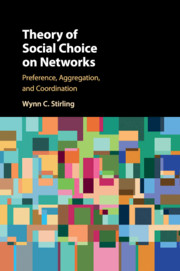Book contents
- Frontmatter
- Dedication
- Contents
- List of Figures
- List of Tables
- Preface and Acknowledgments
- Introduction
- 1 Preference
- 2 Aggregation
- 3 Deliberation
- 4 Coordination
- 5 Randomization
- 6 Satisficing
- Appendix A Dutch Book Theorem
- Appendix B Bayesian Networks
- Appendix C Probability Concepts
- Appendix D Markov Convergence Theorem
- Appendix E Entropy and Mutual Information
- Bibliography
- List of Authors
- Index
5 - Randomization
Published online by Cambridge University Press: 05 September 2016
- Frontmatter
- Dedication
- Contents
- List of Figures
- List of Tables
- Preface and Acknowledgments
- Introduction
- 1 Preference
- 2 Aggregation
- 3 Deliberation
- 4 Coordination
- 5 Randomization
- 6 Satisficing
- Appendix A Dutch Book Theorem
- Appendix B Bayesian Networks
- Appendix C Probability Concepts
- Appendix D Markov Convergence Theorem
- Appendix E Entropy and Mutual Information
- Bibliography
- List of Authors
- Index
Summary
The obvious move is to deny that the notion of knowledge has the importance generally attributed to it, and to try to make the concept of belief do the work that philosophers have generally assigned to the grander concept. I shall argue that this is the right move.
— Richard Jeffrey Probability and the Art of Judgment (Cambridge University Press, 1992)The development of social choice theory for networks has appropriated the syntax of probability theory in several says. We have used the concept of conditioning to form the social influence linkages between individuals, we have used the concept of coherence (avoiding sure loss) to motivate the need to express preferences in terms of conditional mass functions that are manipulated according to the probability syntax, we have applied Bayesian network theory to develop an explicit social model as a coordination ordering over profiles of conjectures, and we have applied Shannon information theory to develop operational concepts of coordination. What we have not yet done, however, is apply probability theory in its traditional usage as a means to model epistemological uncertainty.
Thus far, our discussions regarding social choice have been made under the assumption that the network model is deterministic. All members of the society are assumed to be certain of and agree on their preferences, and the choice mechanism used by the society is purely deterministic. Uncertainty, however, can enter into a social choice problem in several ways. In this chapter we discuss two manifestations of random behavior. One way for uncertainty to arise is when some of the members of the network are random variables whose realizations can influence the interests of the deterministic members of the network. Another way that uncertainty is manifest is when individuals define their preferences in terms of probability distributions rather than with fixed preference orderings.
Social Choice with Stochastic Agents
We now expand the notion of an influence network to include agents who behave as random variables that can influence and be influenced by deterministic agents. For example, agents may be influenced by phenomena beyond their control, such as environmental factors, and ignoring such factors could distort or invalidate the social model.
- Type
- Chapter
- Information
- Theory of Social Choice on NetworksPreference, Aggregation, and Coordination, pp. 115 - 132Publisher: Cambridge University PressPrint publication year: 2016



